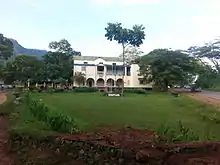Malawi Police Service
The Malawi Police Service is an independent organ of the executive that is mandated by the constitution to protect public safety and the rights of persons in Malawi.[2] The Malawi Police Service is overseen by an Inspector General of Police.

| Malawi Police Service | |
|---|---|
.jpg.webp) | |
| Common name | Malawi Police |
| Abbreviation | MPS |
| Motto | Creating a Safe and Secure Malawi |
| Agency overview | |
| Formed | 1921 |
| Preceding agency |
|
| Jurisdictional structure | |
| Operations jurisdiction | MW |
 | |
| Map of Malawi showing Malawi Police Service Jurisdiction | |
| Size | 118,484 square kilometres (45,747 sq mi) |
| Population | 21,196,629[1] |
| Legal jurisdiction | Malawi |
| Governing body | Ministry of Homeland Security |
| General nature | |
| Operational structure | |
| Headquarters | Malawi National Police Headquarters
Area 30, Lilongwe, Lilongwe 3, Malawi. |
| Police Officers | <14,500 |
| Agency executive |
|
| Parent agency | Malawi Ministry of Homeland Security |
| Departments | List
|
| Regions | List
|
| Website | |
| www | |
Police Ranks
Inspector General
The Inspector General is the head of the Malawi Police Service. The position is appointed by the President of Malawi and confirmed by the National Assembly.[3] The Public Appointments Committee may at any time inquire as to the competence of the person.[3] The Inspector General of Police can only serve for five years in that position.[3] The Inspector General of Police can be removed by the president for being incompetent, incapacitated, compromised, or reaching retirement age.[3] The Inspector General oversees the Malawi Police Service (MPS) under Ministry of Internal Affairs and Public Security.[4] The Inspector General is assisted by a Deputy and two commissioners who run the administration and operations respectively.[5] The current Inspector General is remembered for strengthening MPS by establishing two new policing regions, that is, Central East and South East[6]
Inspector generals:
| IGP | Deputy IGP | Years in Office | Administration |
|---|---|---|---|
| George Kainja | xx | 2020 to present | Lazarus Chakwera |
| Duncan Mwapasa | xx | 2019-2020 | Peter Mutharika |
| Rodney Jose | xx | 2018-2019 | Peter Mutharika |
| Dr Lexten Shame Kachama | Duncan Mwapasa | 2015- 2018 | Peter Mutharika |
| Mr Paul Rodrick Kanyama | Lexten Kachama | 2014- 2015 | Peter Mutharika |
| Mr Loti Thauzeni Dzonzi | Nelson Bophani | 2012–2014 | Joyce Banda |
| Mr Peter M Mukhito | x | 0000 - 2012 | Bingu wa Mutharika |
| Mr Oliver Mathews Cedric Kumbambe | x | 0000-0000 | Bakili Muluzi |
| Mrs Mary Nangwale | x | 2004 - 2005 | Bingu wa Mutharika |
| Joseph Ellywn Aironi | x | 1994-2004 | Bakili Muluzi |
| Mr Lawrence Chimwaza | x | 0000-0000 | Bakili Muluzi |
| Mr Bernard B. Mphinji | x | 0000-0000 | Bakili Muluzi |
| Mr Kennedy S.M Chirambo | x | 0000-0000 | Bakili Muluzi |
| Mr Patrick Chikapa | x | 0000-0000 | Bakili Muluzi |
| Mr Feyani Morrison Chikosa | x | 0000-0000 | Bakili Muluzi |
| Mc William Lunguzi | x | 1983-1994 | Kamuzu Banda, Bakili Muluzi |
| Mr Milward Gibson Namasani | x | 0000-0000 | Kamuzu Banda |
| Mr Elliot Fanuel MBedza | x | 0000-0000 | Kamuzu Banda |
| Mc Lywell Ezron Ngwata | x | 1986-0000 | Kamuzu Banda |
| Mr John Kamwana | x | 1971-1986 | Kamuzu Banda |
Societal Impact
During the Hastings Banda regime the police were involved in suppressing dissent. After the 8 March 1992 pastoral letter:
There were public demonstrations in support of the bishops - notably at the University in Blantyre and Zomba, where soldiers indicated their support for the students and deterred violent police action against the protesters. This was the first sign of the army's future political role. In May 1992 student protesters were joined by striking workers in Blantyre. In two days of riots dozens of protesters were killed by armed police and Young Pioneers.[7]
The capabilities of the Malawi Police Service are growing, but its abilities to deter and investigate crimes, assist victims, and apprehend criminals are extremely limited. The police lack basic equipment (particularly transportation), are poorly funded, and do not receive sufficient training. Public support for the police has continued to drop, due in part to alleged corruption and ineffectiveness in deterring criminal activity.[8]
References
- "Est Malawi Population July 2020". Central Intelligence Agency: The World Factbook. Retrieved 13 April 2020.
- "Chapter XV : The Police" (PDF). Humanrightsinitiative.org. Retrieved 25 October 2013.
- "Chapter XV : The Police" (PDF). Humanrightsinitiative.org. Retrieved 25 October 2013.
- "About MPS - Malawi Police Service". Communitypolicing.mw. 5 October 1921. Archived from the original on 29 October 2013. Retrieved 25 October 2013.
- "Malawi / Africa / Member countries / Internet / Home - INTERPOL". Interpol.int. Retrieved 25 October 2013.
- Reporter, Nyasa Times (25 August 2020). "Malawi Police Establishes Two More Policing Regions". allAfrica.com. Retrieved 14 October 2020.
- Richard Carver, Malawi: Between the Referendum and the Elections, 1 May 1994, accessed April 2021, citing Amnesty International, "Malawi March–July 1992: mass arrests of suspected government opponents", (AI Index: AFR 36/37/92), September 1992.
- "Malawi 2019 Crime & Safety Report". www.osac.gov. Retrieved 24 October 2020.